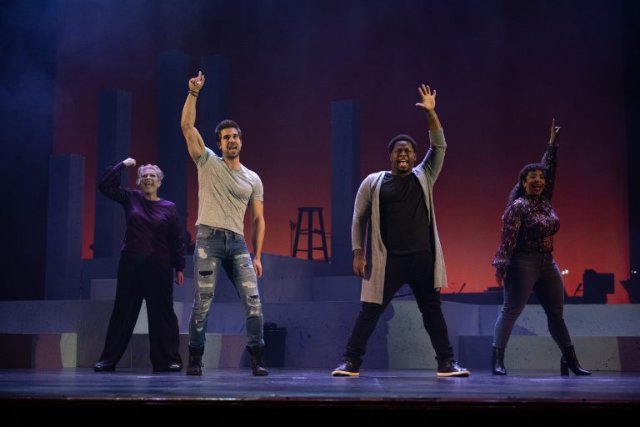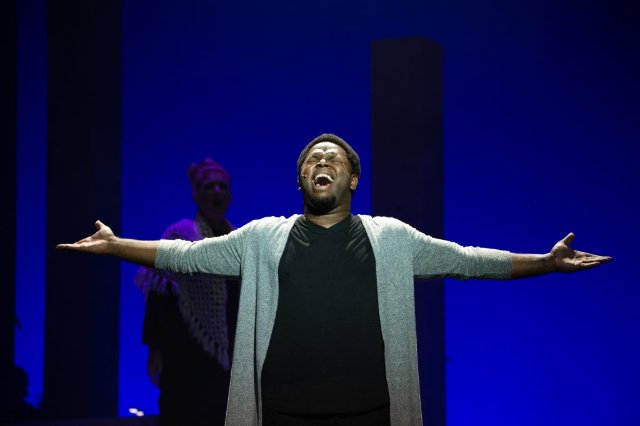Songs for a New World
Ft. Lauderdale's Slow Burn Theatre Company
By: Aaron Krause - Oct 14, 2021
The fantastic foursome comprising the cast of Slow Burn Theatre Company’s rousing production of composer/lyricist Jason Robert Brown’s musical theater piece, Songs for a New World, sing the following: Hear my song, it’ll help you believe in tomorrow. Hear my song, it’ll show you the way you can shine. Hear my song, it was made for the time when you don’t know where to go. Listen to the song that I sing, you’ll be fine.
As you hear the cast gloriously sing the aforementioned lyrics, you feel as though these performers are referring specifically to the show’s musical numbers. Indeed, their timeliness is unquestionable, considering everything the world has experienced during the last 18 months.
Music’s healing and invigorating power is on full display in Slow Burn’s Songs for a New World. It is Brown’s first produced show. The production, which opens the professional, nonprofit company’s 2021-22 season and runs through Oct. 24, marks Slow Burn’s first time on stage since the pandemic began.
Clearly, the opening night audience inside the intimate Amaturo Theater was enthused, judging from the deafening applause with which it greeted the opening lyrics to Brown’s show. It is a hybrid of musical and song cycle. The show features nearly 20 numbers that Brown (Parade, The Bridges of Madison County) had written for other venues and events.
There is no plot. Rather, a common theme connects the numbers. Specifically, the central theme is that “even when everything seems stable and certain, there is one moment that can upend and change anyone’s life.”
Certainly, for theater companies, that moment came on March 12, 2020. That is the date when Broadway went dark. Before the opening moments of Tuesday night’s performance, a projected sign upstage reminded us of that date.
Some might feel that the scenery for this production, designed by Patrick Fitzwater, the production’s director, is symbolic. In particular, the scenic elements consist of multiple platforms. When you look at them individually, they might suggest the individual parts or building blocks of something whole. The scenery, then, could symbolically suggest that theater companies must rebuild following the hits the industry took from the pandemic.
The more practical purpose of the platforms is for Fitzwater, who directs with an attention to detail, to highlight members of the cast at different times, on different levels. But regardless of who is in the limelight at any given moment, the performers’ voices meld to form one magnificent sound when the cast sings as a group. Individually, the performers possess strong, clear, and expressive singing voices. Rather than just sing the songs, they act by credibly expressing the emotions behind the musical numbers. A robust sounding live orchestra accompanies the performers.
Musical theater pieces such as Songs for a New World require actors to play many different roles. In this case, Brown’s songs feature everyone from characters aboard a Spanish sailing ship in 1492 to a modern-day, poor teenager bent on becoming a basketball star. The show features musical styles such as pop, gospel, and jazz.
While the show’s theme is the main thread connecting all the songs, other threads further group songs. For example, in “The Flagmaker, 1775,” a woman whose husband and son are fighting in the Revolutionary War sews a flag while trying to maintain hope. In keeping with the topic of war, the number following that song is “Flying Home.” It features a soldier who has died in battle singing as an airplane flies his body home.
Expectations of love, as well as expectations of money, are two other threads that group songs.
A strong sense of purpose suffuses some of the songs. For instance, in “Just One Step,” a woman climbs out onto the window ledge of her 57th-story apartment, attempting to get her husband’s attention. She is literally one step away from the end. Heather Jane Rolff’s voice oozes sarcasm as she sings “Just One Step.” There is also desperation in her voice.
A matter of life and death may not suffuse the action in “The Steam Train.” However, in the song, a teenager from a poor neighborhood in New York expresses a strong drive to become a basketball star. Darius J. Manuel sings the song with a strong sense of purpose. The result is you don’t doubt for an instant that he will do whatever it takes to achieve his goal. Competing with his bravado, though, is a spoken monologue. It reveals the factors stacked against the young man in his quest. By inserting the spoken monologue, which company members voice, Brown adds tension, which we keenly feel.
Manuel shines not only in “The Steam Train,” but in numbers such as “King of the World.” In the latter, a man is in some form of prison, literal or metaphorical. He demands freedom. That way, he can return to his rightful place as a leader of men. Manuel conveys credible desperation in the number, while moving like a trapped wild animal.
Meanwhile, one of the show’s funnier numbers is “Surabaya Santa,” a parody of the Kurt Weill torch song, “Surabaya Johnny.” To Mrs. Claus, the jolly man is not exactly a faithful hubby. Cecilia Snow, as Mrs. Claus, expresses convincing scorn as she chides her husband for hardly being home.
In another number, an aura of serenity and bravery surrounds “Woman 1,” (Snow) as she sings about how she is not afraid of anything. Unfortunately, she believes her family members, unlike her, are afraid. Those fears have held her back in life, she believes. Perhaps in an effort to keep her character likable, there is little to no anger, or even just annoyance emanating from Snow’s voice.
As “Man 2,” Timothy Michael Quinn radiates credible confidence in the character’s solo, “She Cries.”
Brown, with his clever, meaningful lyrics, might remind some of Stephen Sondheim’s work. For example, in “She Cries,” the character sings, I don’t like to philosophize, I just want to tell a story. Always leave when a woman cries. Never look in a woman’s eyes. You’ll get stuck with a high and rising fever, and then you can’t leave her. Please don’t wait man, it’s almost too late man.
Promptness, though, is not a problem in this production. The lighting cues, for instance, are right on time. And speaking of the lighting, Clifford Spulock’s design adds emphasis, focus, and enhances mood. The presence of stage fog also helps to create atmosphere.
The aura among the opening night audience left no doubt about one thing – live, in-person theater is back…and audiences are ecstatic.
Slow Burn Theatre Company’s production of Songs for a New World continues through Oct. 24 in the Amaturo Theater at The Broward Center for the Performing Arts. The address is 201 S.W. 5th Ave. in Ft. Lauderdale. Show times are 7:30 p.m. Thursday-Saturday. In addition, there are 1 p.m. performances on Saturdays and Sundays, and 6:30 p.m. performances on Sundays. Ticket prices range from $49 to $65. To buy tickets, go to https://www.ticketmaster.com/artist/838926?venueId=106505&brand=broward&camefrom=cfc_broward_web. Masks are required, as are proof of vaccination or recent negative COVID tests.


